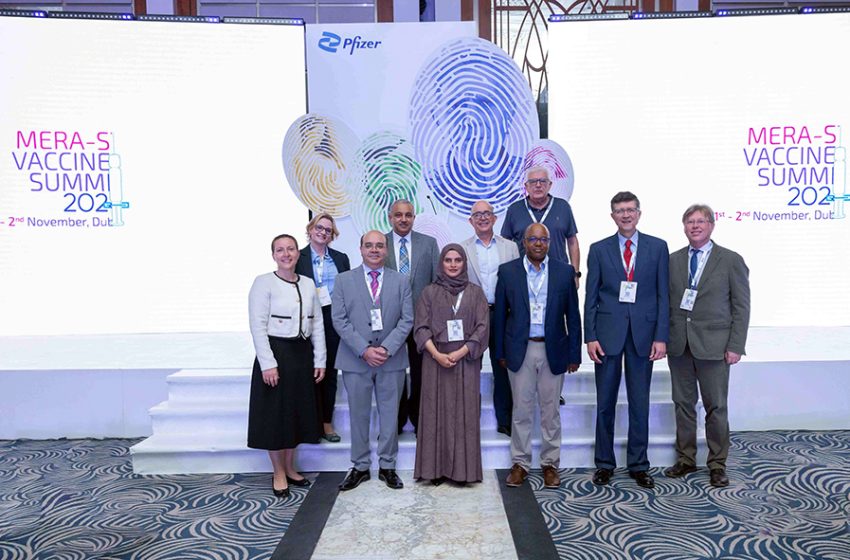Ramadan Evenings Reimagined.. A Refined Iftar Experience at Fairmont The Palm’s Fairuz Garden
International and Regional Experts Address the Role of Vaccines in Disease Management during Pfizer MERA Vaccines Summit 2024

- The MERA Vaccines Summit brought together more than 180 physicians and healthcare professionals to Dubai to discuss a range of communicable diseases.
- The summit highlighted the role of vaccinations in at-risk groups and shed light on global best practices for vaccination programs.
Dubai, UAE – 05 November 2024
International and regional experts addressed more than 180 regional physicians and healthcare professionals during the annual vaccines summit, hosted by Pfizer Middle East, Russia and Africa (MERA), from 1-2 November, in Dubai, United Arab Emirates, to discuss the global and regional impact of vaccinations and recommended vaccine strategies for various patient groups.
Critical issues discussed during the MERA Vaccines Summit included the remaining burden of pneumococcal disease, the evolution and impact of pneumococcal conjugate vaccines, and the importance of vaccination in combating antimicrobial resistance. Speakers also addressed the global burden of respiratory syncytial virus (RSV), with discussions on expanding immunization coverage, particularly among adults and through maternal vaccination. Additionally, the summit explored post-COVID-19 vaccine regulatory strategies and the prevention of invasive meningococcal disease in at-risk populations.
According to the World Health Organization (WHO), vaccination is one of the most cost-effective ways to avoid diseases such as diphtheria, tetanus, pertussis, influenza, and measles. It has been estimated that vaccines can prevent 4 to 5 million deaths per year, with the ability to prevent 1.5 million more if global coverage of vaccines improves.[i] Today, more people benefit from vaccines to help prevent certain infectious diseases than ever before, providing essential health benefits at all ages, from infant populations to seniors.[ii] By helping reduce the potential seriousness of disease outbreaks, vaccines can help societies mitigate disease epidemics and the subsequent burdens on human health, public services, the economy, and political stability.[iii]
Stressing the rising need to address the burden of respiratory disease on a global and regional level, Dr. Iona Munjal, MD FAAP, Executive Director in Pfizer Vaccine Clinical Research and Development said, “From changing climates to increased travel, the world faces a number of realities that facilitate the transmission of infectious diseases. In addition, improved diagnostics have revealed the nature of these threats including the contribution of leading respiratory pathogens such as COVID-19, RSV, Pneumococcal, and Influenza. Our industry-leading pipeline, scientific expertise and end-to-end global capabilities put Pfizer at the forefront of a new era of vaccine innovation to help address these realities as we continue in our efforts to deliver more vaccine breakthroughs to the world.”
Key international speakers at the event included Javier Diez-Domingo, Head of Vaccine Research Area, Center for Public Health Research (FISABIO), Spain; Jaime Eduardo Fergie, Medical Director, Global Institute for Hispanic Health and Director of Pediatric Infectious Diseases, Driscoll Children’s Hospital, Corpus Christi, Texas, United States of America; and Antoni Torres Martí, Senior Consultant of the Respiratory and Intensive Care Unit, Respiratory Institute, Hospital Clinic of Barcelona, Spain.
Setting the stage for the important discussions at the event, Prof. Bassam Mahboub, Consultant Respiratory Medicine Emirates Thoracic Society, emphasized the need for ongoing collaboration between the medical community and vaccine developers to protect public health and reduce the overall disease burden. He said, “Communicable diseases, particularly respiratory diseases, are becoming a growing burden in our region, in line with the aging population, prevalent chronic diseases and high smoking rates. Vaccinations have a critical role to play in reducing the impacts of these diseases at an individual and community level. As healthcare providers, it is our responsibility to stay ahead of emerging threats and ensure that all patient populations, particularly those most vulnerable, have access to life-saving vaccines.”

Dr Hammam Haridy, Pfizer MERA Senior Director Regional Medical & Scientific Affairs, Vaccines and Anti Virals, added, “We believe vaccination is one of the best ways possible to help protect infants, children, and adults against infectious diseases. Our 175-year track record of researching, developing, manufacturing, and delivering innovative medicines and vaccines has led to reduce the burden of infectious diseases and decrease the use of antibiotics for several deadly infectious diseases. The MERA Vaccines Summit reaffirmed the importance of collaborative efforts and tailored vaccination strategies for various patient populations, ensuring we are better equipped to protect vulnerable groups and reduce the antibiotic resistance across the region.”
During the event, Pfizer reaffirmed its commitment to impacting public health through vaccines. Pfizer’s vaccines have been pivotal in advancing public health by preventing, controlling, and nearly eradicating numerous infectious diseases, protecting millions of lives globally and across the MERA region. The biopharmaceutical leader continues to focus on research and development in new areas, with the goal of improving patient lives.
[i] Immunization. WHO. Published December 5, 2019. Accessed May 11, 2021. Available at: https://www.who.int/news-room/facts-in-pictures/detail/immunization#:~:text=Immunization%20currently%20prevents%204%2D5,cost%2Deffective%20public%20health%20interventions.
[ii] Vaccines. Pfizer. Accessed February 5, 2021. Available at: https://www.pfizer.com/partners/discovery/therapeutic-areas/vaccines
[iii] Andre FE, et al. Vaccination greatly reduces disease, disability, death and inequity worldwide. WHO. Published March 4, 2011. Accessed May 10, 2021. Available at: https://www.who.int/bulletin/volumes/86/2/07-040089/en/.






